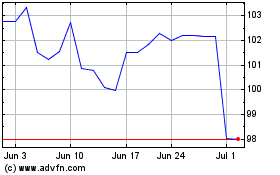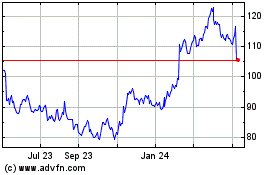DraftKings and FanDuel Agree to Merge
November 18 2016 - 10:20AM
Dow Jones News
Two major daily fantasy sports sites, DraftKings Inc. and
FanDuel Inc., said they have agreed to set aside years of bitter
rivalry and become one as they face down continuing regulatory and
legal challenges to their industry.
The two companies, which together spent upward of $500 million
on advertising last year to try to build unique brands, had been
talking about merging for months, with those talks accelerating in
the last few weeks.
As expected, DraftKings Chief Executive Jason Robins will serve
as CEO of the new company, while FanDuel CEO Nigel Eccles will be
chairman of the board. The new board will also comprise three
directors from FanDuel and three from DraftKings, with the
company's headquarters divided between New York and Boston offices.
The deal is expected to close in the second half of 2017.
The companies haven't yet decided what brand they will operate
under, or if they will maintain both brands. They are not
disclosing their valuation, which is expected to have dropped
precipitously in the last year in the wake of regulatory and legal
challenges.
Even combined, the companies are relatively small, with FanDuel
taking in around $100 million in revenue last year.
They have had an outsize profile due to heavy advertising and
financial backing from major media and sports companies. FanDuel is
backed by Comcast Corp., while DraftKings has investments from 21st
Century Fox Inc.
21st Century Fox and News Corp, parent company of The Wall
Street Journal, share common ownership.
Their massive advertising outlays last year backfired somewhat
when they helped to lead to regulatory and legal probes by several
state attorneys general who said the sites violated state gambling
laws. The companies, which deny any wrongdoing, have also faced
civil lawsuits from consumers, as well as investigations by the
U.S. Justice Department, previously reported by the Journal and
others.
The challenges caused them to pull out of several key states,
including Illinois and, in the case of FanDuel, Texas.
The companies over the summer won a victory in New York's
legislature that allows them to resume operating there; they'd shut
down in March after being sued by the state's attorney general.
They have lobbied heavily to try to convince state legislatures to
explicitly legalize the activity. Ten states so far have explicit
laws recognizing the legality of fantasy sports.
Neither company has figured out a business plan to become
profitable. They both cut back significantly on advertising during
the current football season as legal and lobbying bills have
stacked up, painting a bleak financial picture, according to
insiders and analysts.
The advertising cuts have even had ripple effects across the
sports media industry. Last week, executives at Walt Disney Co.
told investors that a "significant" decrease in advertising from
fantasy firms during the quarter ended Oct. 1 contributed to a 13%
decline in ESPN ad revenue.
The sites decided that the solution was to merge their legal and
regulatory efforts to save costs and get on the same page with
their strategy going forward, according to Scott Sher, an attorney
for FanDuel.
Mr. Sher said Thursday he is expecting the deal to undergo an
antitrust review by the Federal Trade Commission but doesn't
believe that will pose a problem. The companies account for the
vast majority of daily fantasy sports players, which they estimate
to number around 5 million.
Still, they don't think they will have any issues because daily
fantasy sports—which allows players to assemble virtual teams and
get results at a fast clip—is part of a broader fantasy sports
universe, Mr. Sher said. Websites like Yahoo, ESPN and NFL.com
operate season-long fantasy sports leagues and could enter the
daily fantasy sports space once regulatory and legal issues are
resolved, Mr. Sher said. The sites will also be competing against
the season-long fantasy sports sites to acquire new users, Mr. Sher
said, which will keep them competitive in both pricing and
innovation.
"It only is successful if they can grow and capture users" from
people playing other sites, Mr. Sher said.
Erich Schwartzel contributed to this article.
Write to Alexandra Berzon at alexandra.berzon@wsj.com
(END) Dow Jones Newswires
November 18, 2016 10:05 ET (15:05 GMT)
Copyright (c) 2016 Dow Jones & Company, Inc.
Walt Disney (NYSE:DIS)
Historical Stock Chart
From Mar 2024 to Apr 2024

Walt Disney (NYSE:DIS)
Historical Stock Chart
From Apr 2023 to Apr 2024
